Submitted:
14 January 2024
Posted:
15 January 2024
You are already at the latest version
Abstract
Keywords:
1. Introduction
2. System dynamics model
3. Trajectory optimization
3.1. Constraints introduced by the GA scenario
4. Summary of the optimization algorithm
- 1)
- It involves eight unknowns, including the 5-D numerical multipliers, , and the 3-D GA velocity vector, . The GA date (t_G) remains fixed throughout the solution.
- 2)
- Additionally, nine identical equations must be satisfied: the 4-D intermediate GA constraints in Eq. (23), the 1-D rigid conditions in Eq. (25) utilizing the inequality condition from Eq. (24), the 3-D GA transversal condition, , derived from Eqs. (15), and the 1-D stationarity condition specified in Eq. (17)
- 3)
- According to Figure 3, the gravity-assist generates the velocity increment Eq. (8), instead of the GA velocity vector . It is essential to note that in Eq. (15), and are exclusively utilized to revise the position and velocity co-state vectors at the date immediately after the GA, and they are omitted from the penalty factor Eq. (27).
- 4)
- Furthermore, the mass, its corresponding co-state, and the position vector remain continuous immediately at and during the GA date, and hence are fixed within the GA scenario.
5. Switching function detection
6. Numerical analysis
7. Conclusions
References
- Wagner, A.S. ; Automated trajectory design for impulsive and low thrust interplanetary mission analysis. Ph.D. dissertation, Iowa State University, 2014.
- Bernelli-Zazzera, F.; Lavagna, M.; Armellin, R.; Di Lizia, P.; Morselli, A.; Olympio, J.; Izzo, D.; Summerer, L. Trajectory optimisation under uncertainties. ESA/ACT, Ariadna Final Report, id., 2012, 10, 4101. [Google Scholar]
- Williams, S.N.; Coverstone, V. Benefits of solar electric propulsion for the next generation of planetary exploration missions. Journal of the Astronautical Sciences, 1997, 45, 143–159. [Google Scholar] [CrossRef]
- Miele, A.; Wang, T. Multiple-subarc gradient-restoration algorithm, part 1: algorithm structure. Journal of Optimization Theory and Applications 2023, 116, 1–17. [Google Scholar] [CrossRef]
- Carter, T.; Humi, M. Planar optimal two-impulse transfers with closed-form solutions of the transverse transfers. Journal of Optimization Theory and Applications, 2016, 169, 262–279. [Google Scholar] [CrossRef]
- Pontani, M.; Miele, A. Theorem of optimal image trajectories in the restricted problem of three bodies. Journal of Optimization Theory and Applications, 2016, 168, 992–1013. [Google Scholar] [CrossRef]
- Gong, S.; Macdonald, M. Review on solar sail technology. Astrodynamics, 2019, 3, 93–125. [Google Scholar] [CrossRef]
- Mereta, A.; Izzo, D. Target selection for a small low-thrust mission to near-Earth asteroids. Astrodynamics, 2018, 2, 249–263. [Google Scholar] [CrossRef]
- Rayman, M.D.; Varghese, P.; Lehman, D.H.; Livesay, L.L. Results from the deep space 1 technology validation mission. Acta Astronautica, 2000, 47, 475–487. [Google Scholar] [CrossRef]
- Kuninaka, H.; Nishiyama, K.; Funakai, I.; Tetsuya, K.; Shimizu, Y.; Kawaguchi, J.I. Asteroid rendezvous of HAYABUSA explorer using microwave discharge ion engines. In 29th International Electric Propulsion Conference, 2005, number IEPC-2005-10.
- Kawaguchi, J.; Fujiwara, A.; Uesugi, T.K. The ion engines cruise operation and the earth swingby of “Hayabusa” (Muses-C). Space Technology, 2005, 25, 105–115. [Google Scholar]
- Rayman, M.D.; Fraschetti, T.C.; Raymond, C.A.; Russell, C.T. Dawn: A mission in development for exploration of main belt asteroids Vesta and Ceres. Acta Astronautica, 2006, 58, 605–616. [Google Scholar] [CrossRef]
- Kugelberg, J.; Bodin, P.; Persson, S.; Rathsman, P. Accommodating electric propulsion on SMART-1. Acta Astronautica, 2004, 55, 121–130. [Google Scholar] [CrossRef]
- Betts, J. Survey of Numerical Methods for Trajectory Optimization. Journal of Guidance, Control, and Dynamics, 1998, 21, 193–207. [Google Scholar] [CrossRef]
- Conway, B.A. A Survey of Methods Available for the Numerical Optimization of Continuous Dynamic Systems. Journal of Optimization Theory and Applications, 2011, 152, 271–306. [Google Scholar] [CrossRef]
- Wang, J.; Fečkan, M.; Debbouche, A. Time Optimal Control of a System Governed by Non-instantaneous Impulsive Differential Equations. Journal of Optimization Theory and Applications, 2019, 182, 573–587. [Google Scholar] [CrossRef]
- Betts, J.T.; Frank, P.D. A sparse nonlinear optimization algorithm. Journal of Optimization Theory and Applications, 1994, 82, 519–541. [Google Scholar] [CrossRef]
- Ranieri, C.L.; Ocampo, C.A. Indirect Optimization of Three-Dimensional Finite-Burning Interplanetary Transfers Including Spiral Dynamics. Journal of Guidance, Control, and Dynamics 2009, 32, 444–454. [Google Scholar] [CrossRef]
- Murray, D.; Yakowitz, S. Differential dynamic programming and Newton’s method for discrete optimal control problems. Journal of Optimization Theory and Applications, 1984, 43, 395–414. [Google Scholar] [CrossRef]
- Saghamanesh, M.; Novinzadeh, A. Optimal guidance of spacecraft rendezvous via free initial velocity vector. Proceedings of the Institution of Mechanical Engineers, Part G: Journal of Aerospace Engineering, 2014, 228, 1020–1032. [Google Scholar] [CrossRef]
- Saghamanesh, M.; Baoyin, H. A robust homotopic approach for continuous variable low-thrust trajectory optimization. Advances in Space Research, 2018, 62, 3095–3113. [Google Scholar] [CrossRef]
- Tang, G.; Hauser, K. A data-driven indirect method for nonlinear optimal control. Astrodynamics. 2019, 3, 345–59. [Google Scholar] [CrossRef]
- Enright, P.J.; Conway, B.A. Discrete Approximations to Optimal Trajectories Using Direct Transcription and Nonlinear Programming. Journal of Guidance, Control, and Dynamics, 1992, 15, 994–1002. [Google Scholar] [CrossRef]
- Hargraves, C.R.; Paris, S.W. Direct trajectory optimization using nonlinear programming and collocation. Journal of Guidance, Control, and Dynamics, 1987, 10, 338–342. [Google Scholar] [CrossRef]
- Han, S.P. A globally convergent method for nonlinear programming. Journal of Optimization Theory and Applications, 2012, 22, 297–309. [Google Scholar] [CrossRef]
- Lantoine, G.; Russell, R.P. A hybrid differential dynamic programming algorithm for constrained optimal control problems. Part 1: Theory. Journal of Optimization Theory and Applications, 2012, 154, 382–417. [Google Scholar] [CrossRef]
- Lantoine, G.; Russell, R.P. A hybrid differential dynamic programming algorithm for constrained optimal control problems. part 2. Application. Journal of Optimization Theory and Applications, 2012, 154, 418–442. [Google Scholar] [CrossRef]
- Cheng, L.; Wang, Z.; Jiang, F. Real-time control for fuel-optimal moon landing based on an interactive deep reinforcement learning algorithm. Astrodynamics, 2019, 3, 375–86. [Google Scholar] [CrossRef]
- Bertrand, R.; Epenoy, R. New smoothing techniques for solving bang–bang optimal control problems-numerical results and statistical interpretation. Optimal Control Applications and Methods, 2012, 23, 171–197. [Google Scholar] [CrossRef]
- Jiang, F.; Baoyin, H.; Li, J. Practical techniques for low-thrust trajectory optimization with homotopic approach. Journal of Guidance, Control, and Dynamics, 2012, 35, 245–258. [Google Scholar] [CrossRef]
- Hans, S.; Renjith, R.K. Finite difference scheme for automatic costate calculation. Journal of Guidance, Control, and Dynamics, 1996, 19, 231–239. [Google Scholar]
- Martell, C.A.; Lawton, J.A. Adjoint variable solutions via an auxiliary optimization problem. Journal of Guidance, Control, and Dynamics, 1995, 18, 1267–1272. [Google Scholar] [CrossRef]
- Saghamanesh, M.; Baoyin, H. Practical Mission Design for Mars Trajectory Optimization Based on the Ephemeris Model and Full Perturbation System. Advances in the Astronautical Sciences, 2018, 165, 1293–1313. [Google Scholar]
- Saghamanesh, M.; Taheri, E.; Baoyin, H. Systematic Low-Thrust Trajectory Design to Mars Based on a Full Ephemeris Modelling. Advances in Space Research, 2019, 64, 2356–78. [Google Scholar] [CrossRef]
- Saghamanesh, M.; Taheri, E.; Baoyin, H. Interplanetary Gravity-Assist Fuel-Optimal Trajectory Optimization with Planetary and Solar Radiation Pressure Perturbations. Celestial Mechanics and Dynamical Astronomy, 2019, 132, 1–21. [Google Scholar] [CrossRef]
- Saghamanesh, M.; Baoyin, H. Optimal Gravity-Assist Low-Thrust Trajectory Using a Robust Homotopic Approach. IEEE/CSAA Guidance, Navigation and Control 2018, 1–8. [Google Scholar]
- Hansen, C.J.; Bolton, S.J.; Matson, D.L.; Spilker, L.J.; Lebreton, J.P. The Cassini/ Huygens flyby of Jupiter. Icarus 2004, 172, 1–8. [Google Scholar] [CrossRef]
- McNutt Jr, R.L.; Solomon, S.C.; Grard, R.; Novara, M.; Mukai, T. An international program for Mercury exploration: synergy of MESSENGER and BepiColombo. Advances in Space Research, 2004, 33, 2126–2132. [Google Scholar] [CrossRef]
- McNutt Jr, R.L.; Solomon, S.C.; Gold, R.E.; Leary, J.C. MESSENGER Team: The MESSENGER mission to Mercury: Development history and early mission status. Advances in Space Research, 2006, 38, 564–571. [Google Scholar] [CrossRef]
- Hechler, M. Rosetta mission design. Advances in Space Research 1997, 19, 127–136. [Google Scholar] [CrossRef]
- Guo, Y.; Farquhar, R.W. New Horizons mission design. Space science reviews 2008, 140, 49–74. [Google Scholar] [CrossRef]
- D’Amario, L.A.; Bright, L.E.; Wolf, A.A. Galileo trajectory design. Space Science Reviews, 1992, 60, 23–78. [Google Scholar]
- Curtis, H. Orbital mechanics for engineering students. Butterworth-Heinemann, 2013.
- Strange, N.J.; Longuski, J.M. Graphical method for gravityassist trajectory design. Journal of Spacecraft and Rockets, 2002, 30, 9–16. [Google Scholar] [CrossRef]
- Prado, A.F.B. Powered swingby. Journal of Guidance, Control, and Dynamic, 1996, 19, 1142–1147. [Google Scholar]
- Felipe, G.; Prado, A.F.B. Trajectory selection for a spacecraft performing a two-dimensional swing-by. Advances in Space Research 2004, 34, 2256–2261. [Google Scholar]
- Broucke, R.A. The celestial mechanics of gravity assist. AIAA/AAS Astrodynamics Conference, 1988, 15-18.
- Yam, C.H.; McConaghy, T.T.; Chen, K.J.; Longuski, J.M. Preliminary design of nuclear electric propulsion missions to the outer planets. AIAA/AAS Astrodynamics Specialist Conference, 2004, 5393, 16–19. [Google Scholar]
- Trélat, E. Optimal control and applications to aerospace: some results and challenges. Journal of Optimization Theory and Applications, 2012, 154, 713–758. [Google Scholar] [CrossRef]
- Russell, R.P. Primer Vector Theory Applied to Global Low-Thrust Trade Studies. Journal of Guidance, Control, and Dynamics, 2007, 30, 460–472. [Google Scholar] [CrossRef]
| 1 |
https://ssd.jpl.nasa.gov/horizons.cgi [Retrieved on: Feb. 20, 2019] |
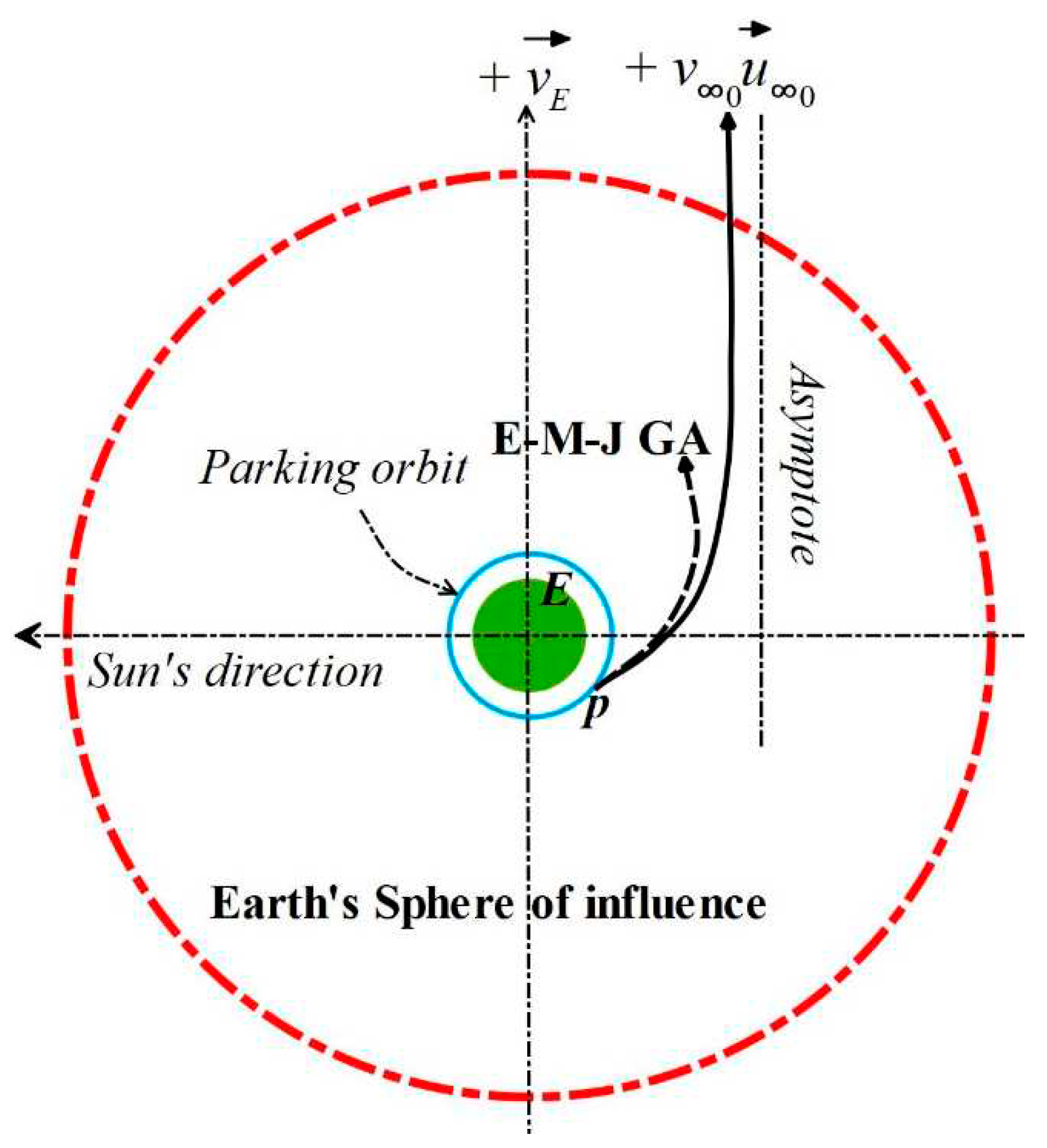
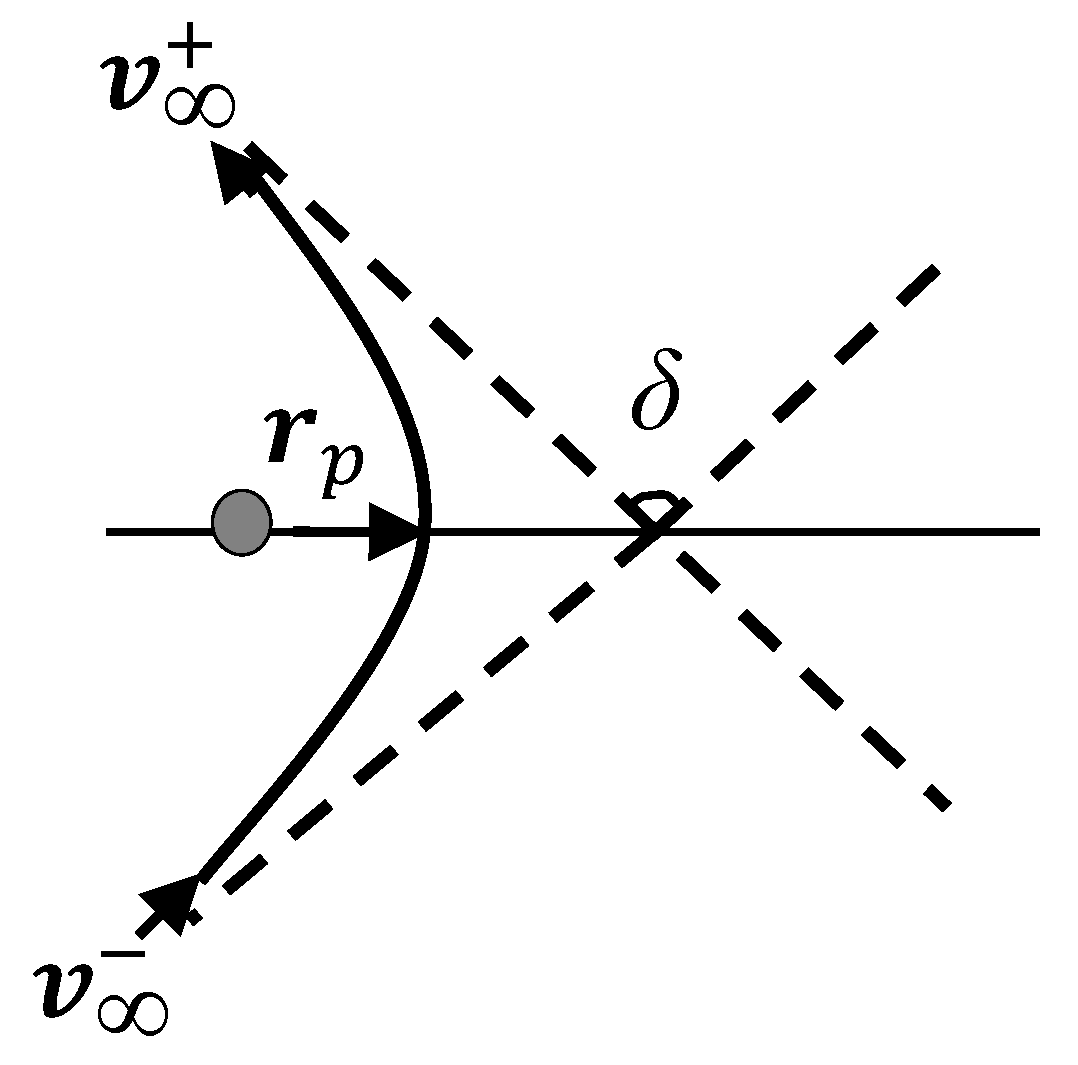
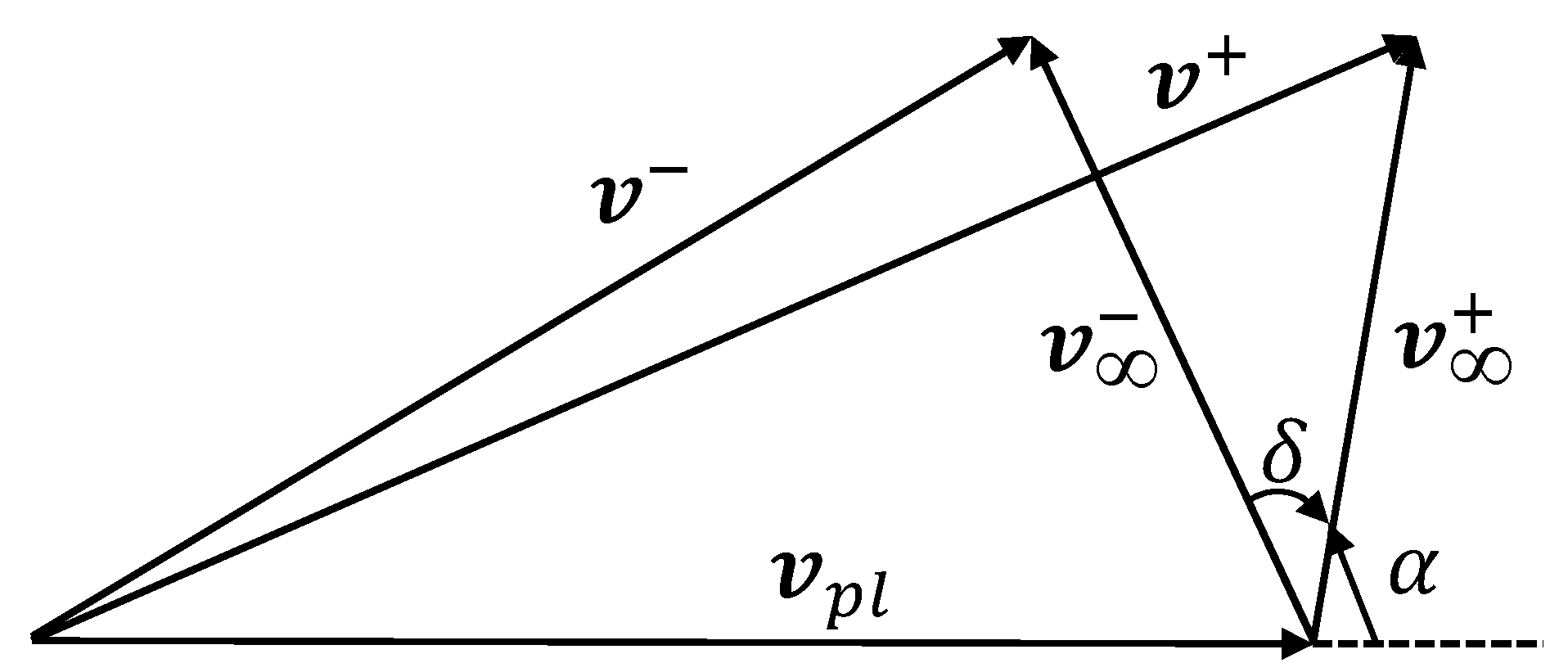
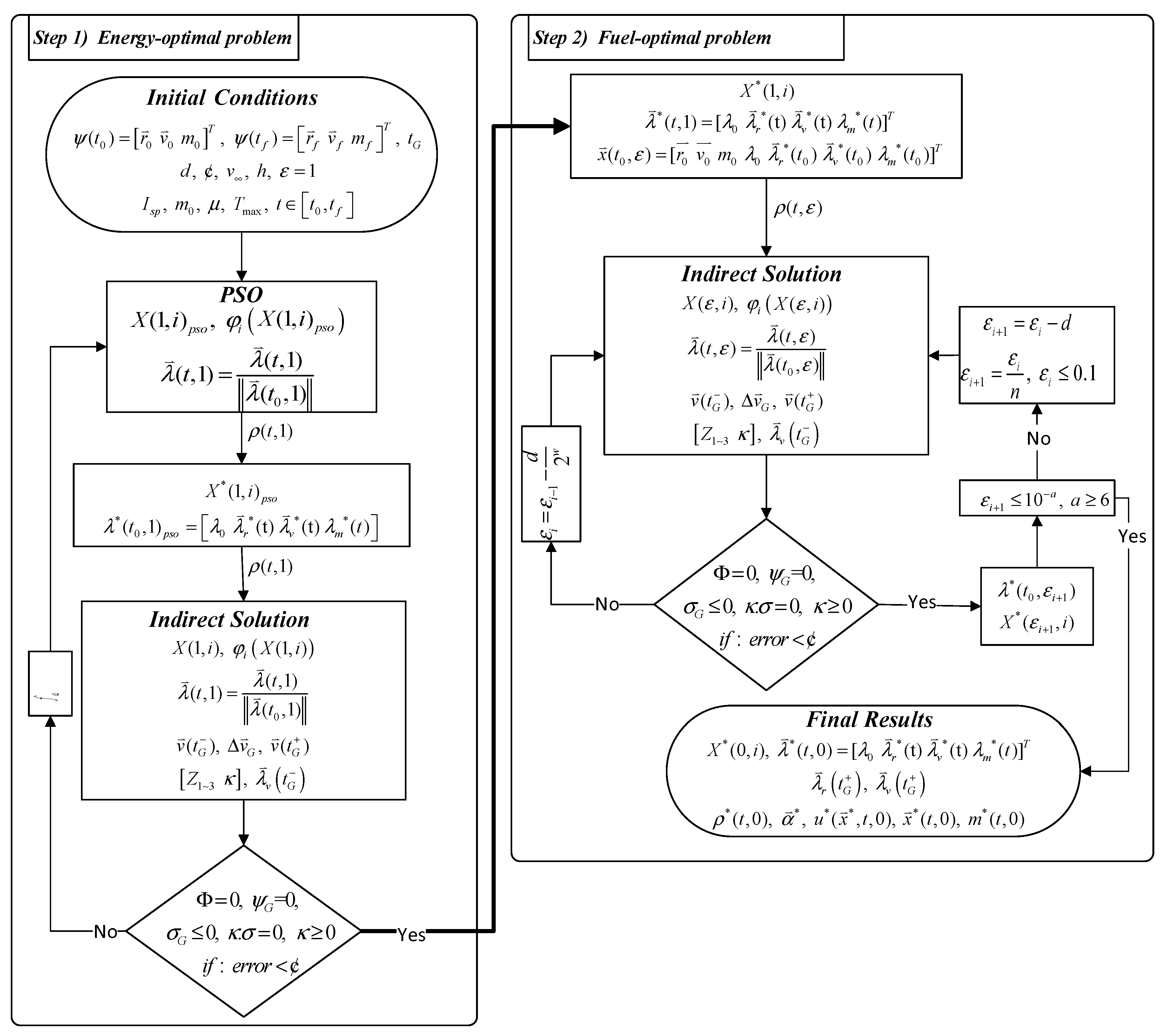
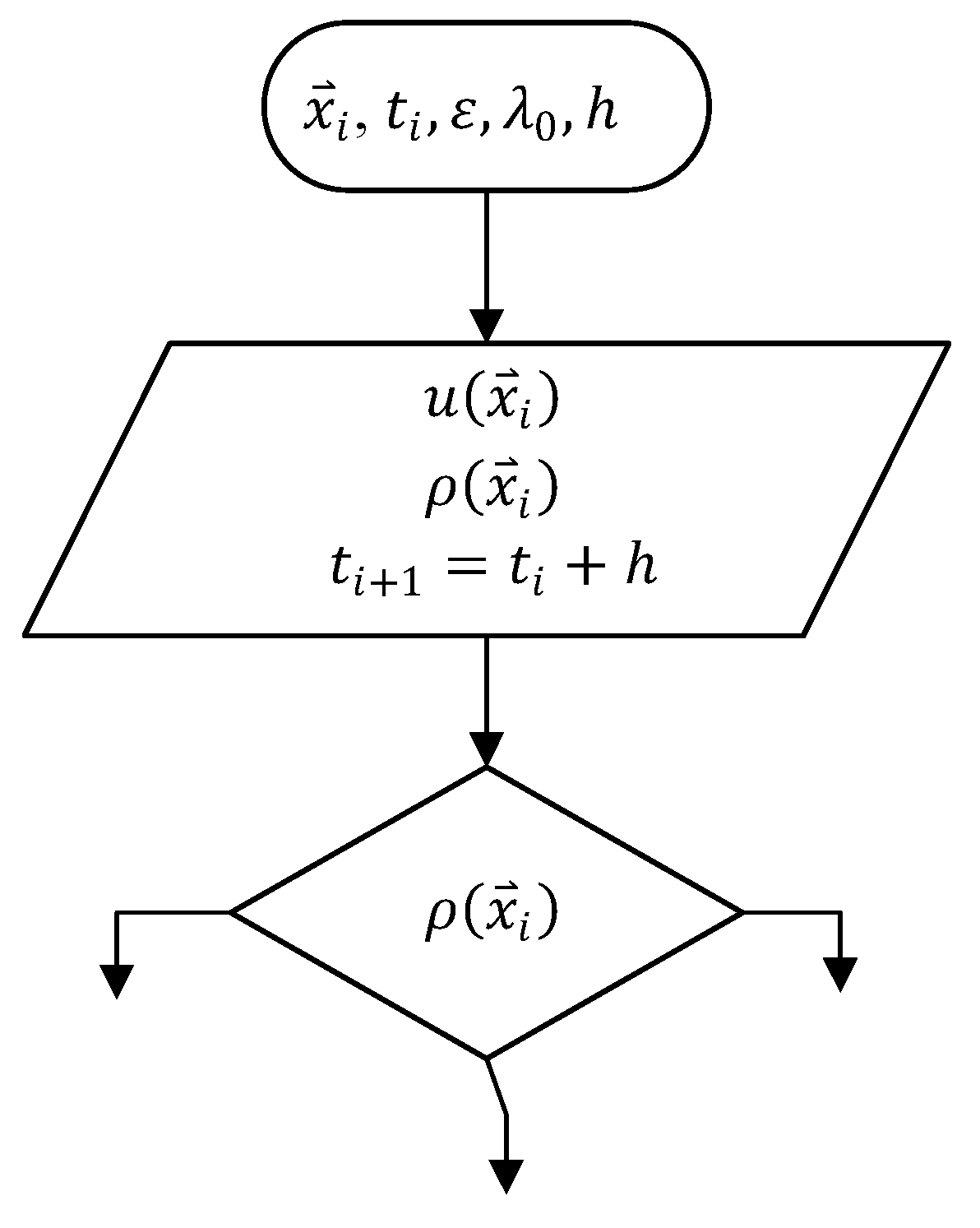
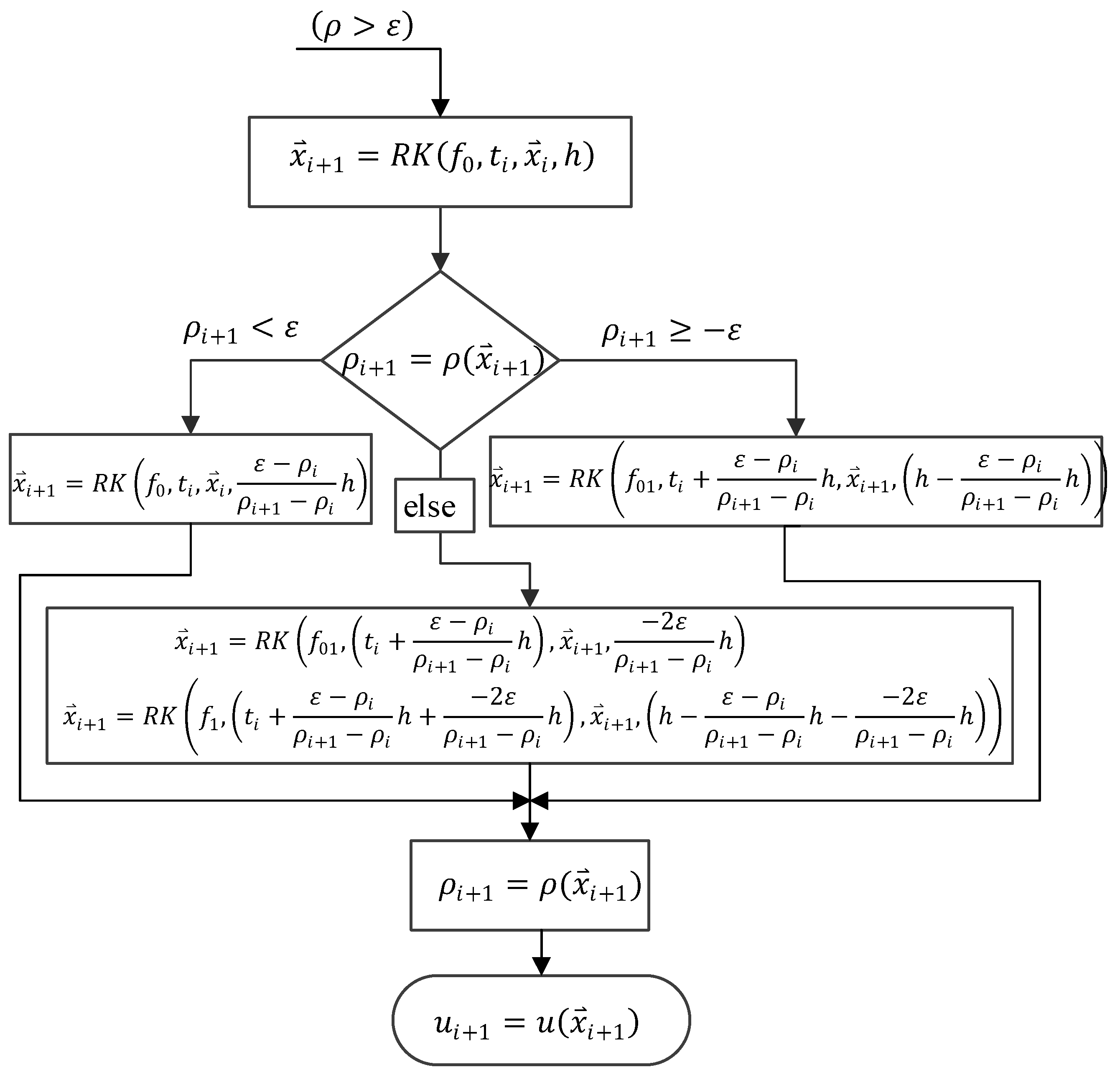
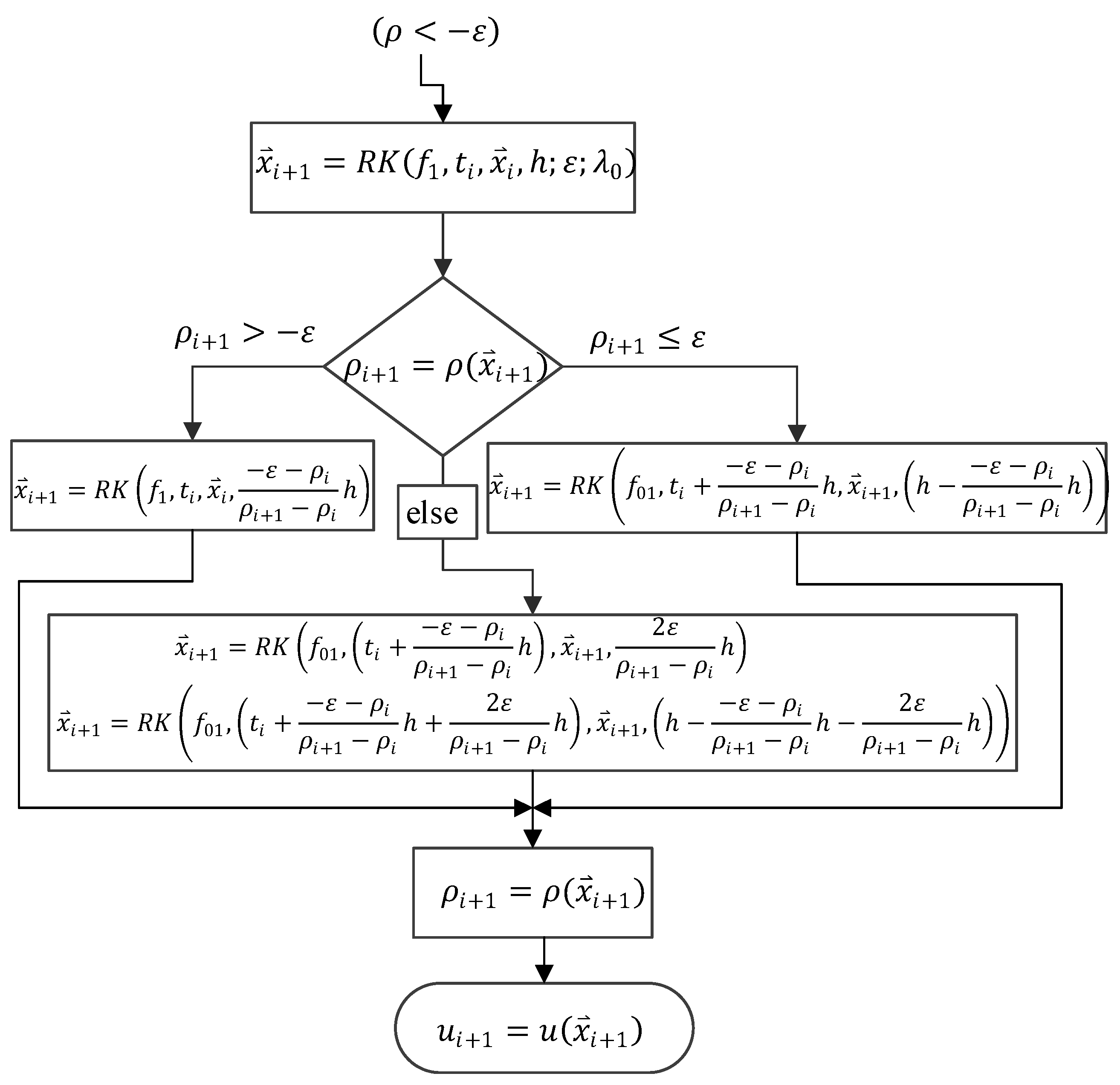
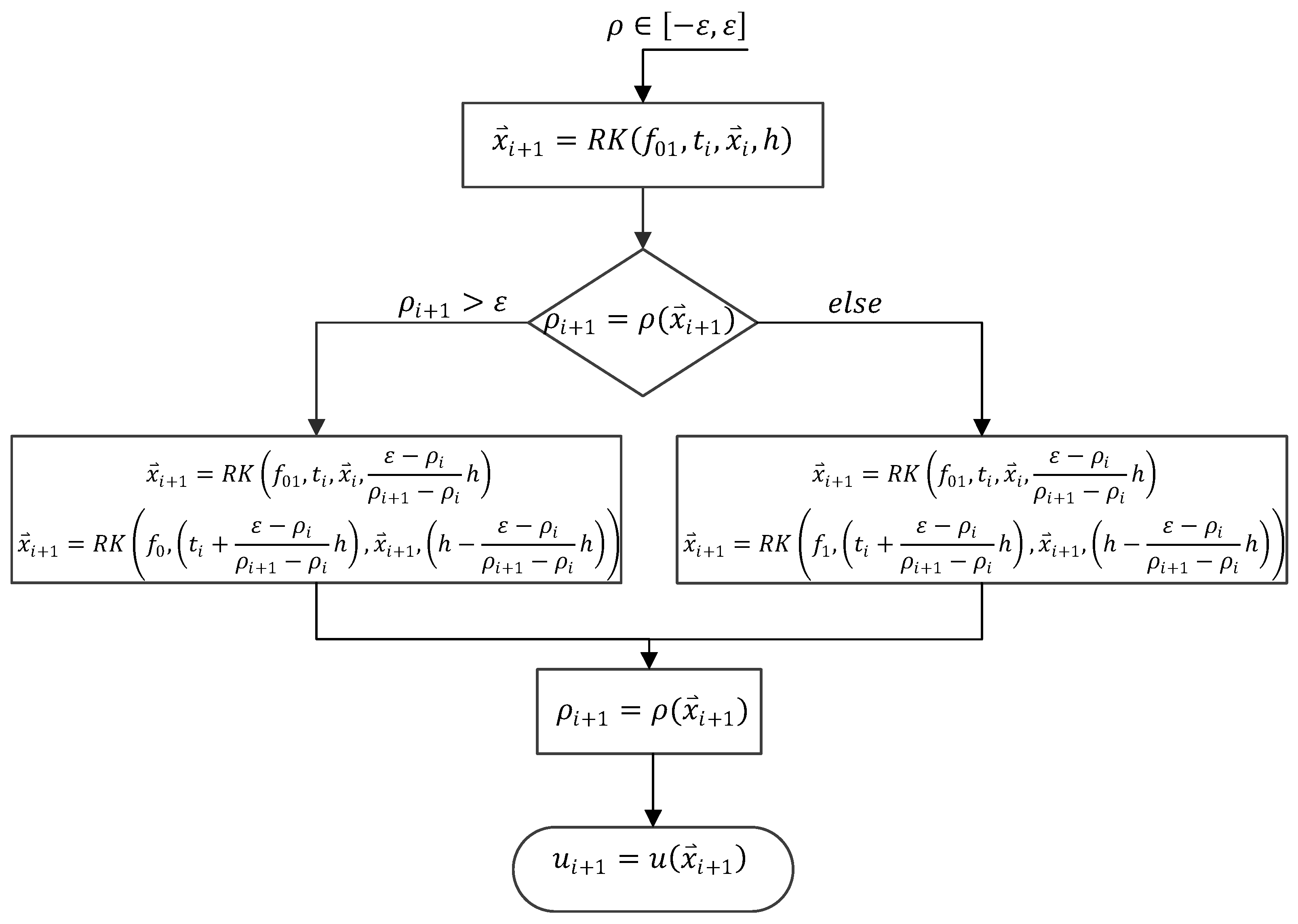
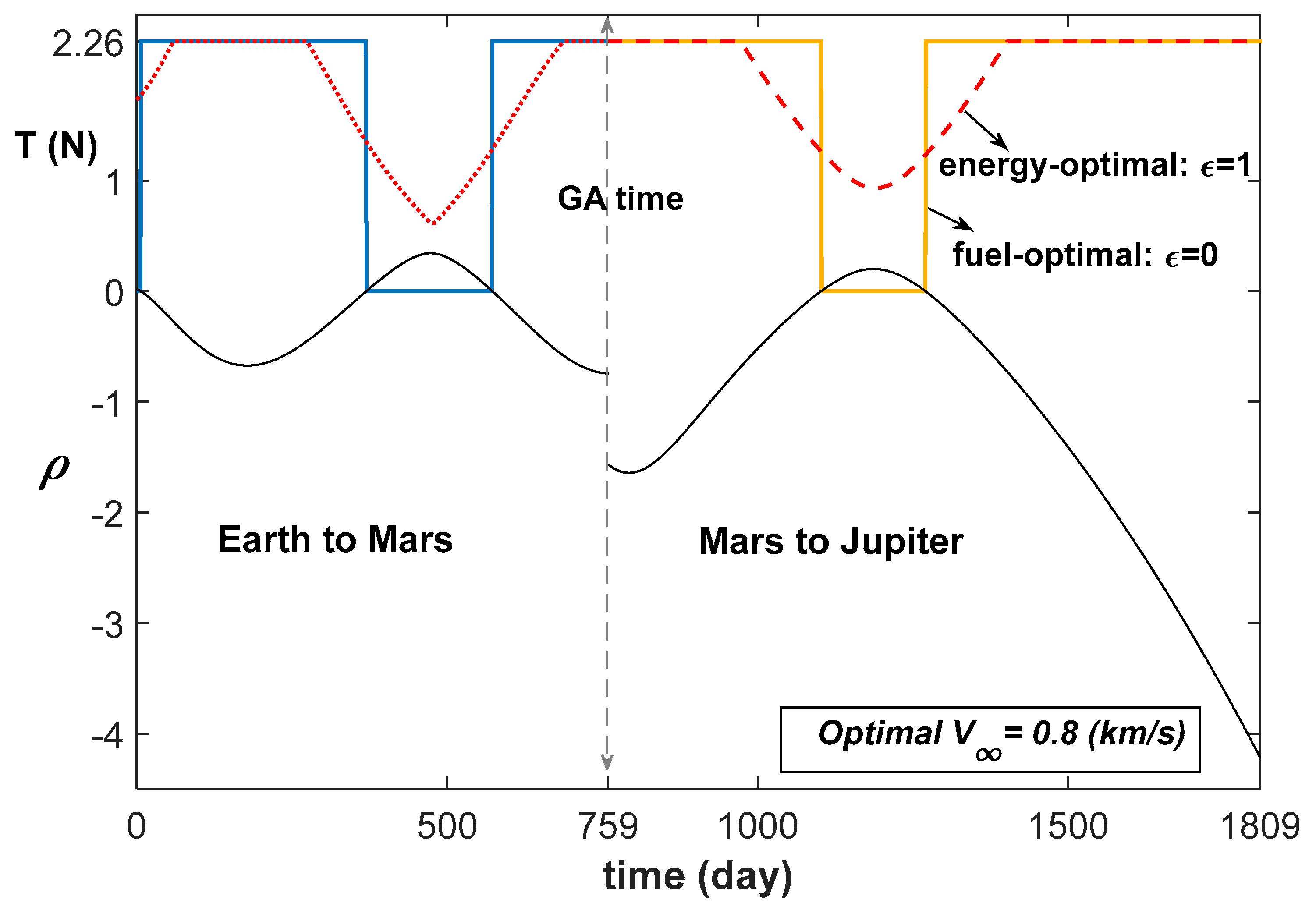
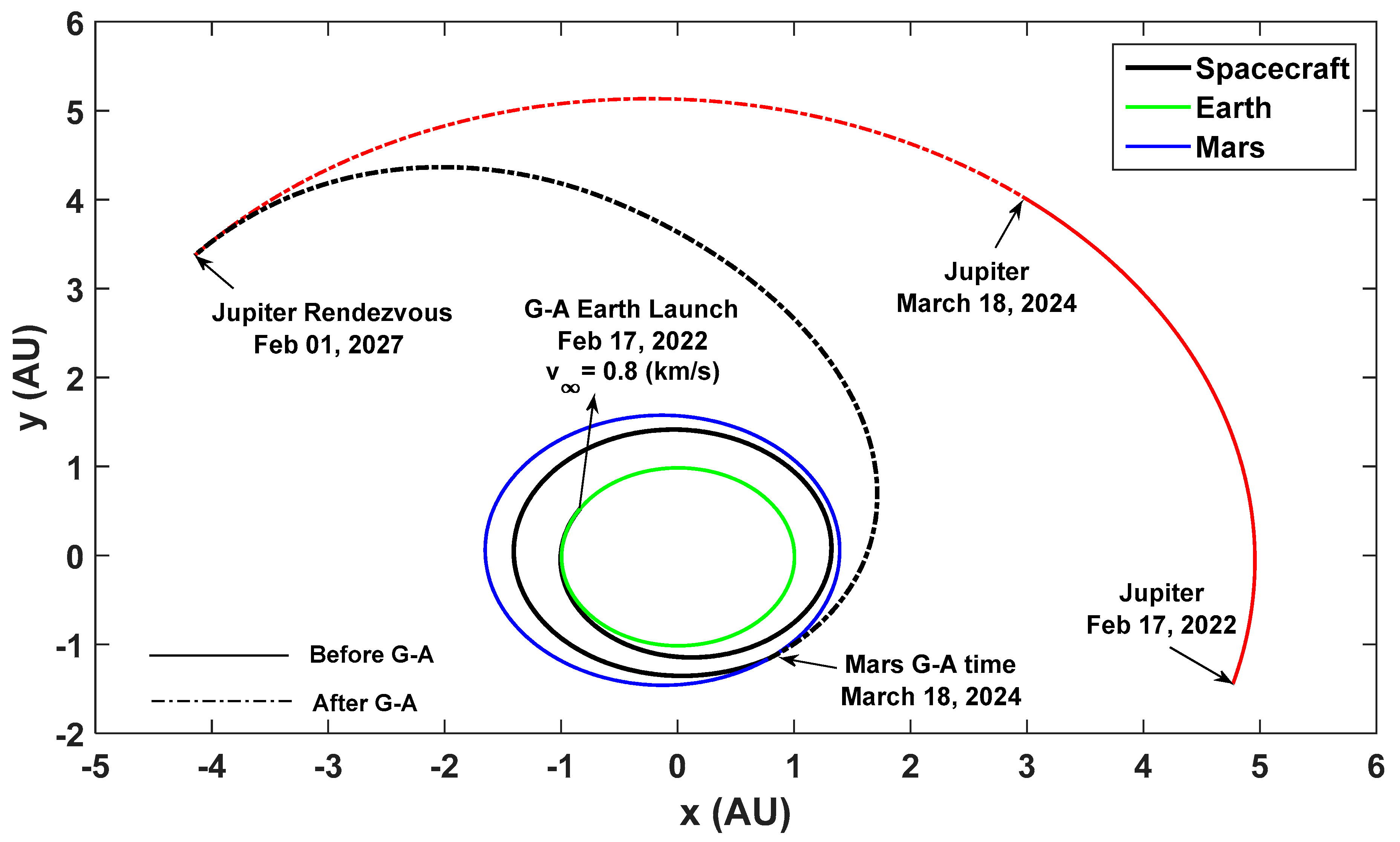
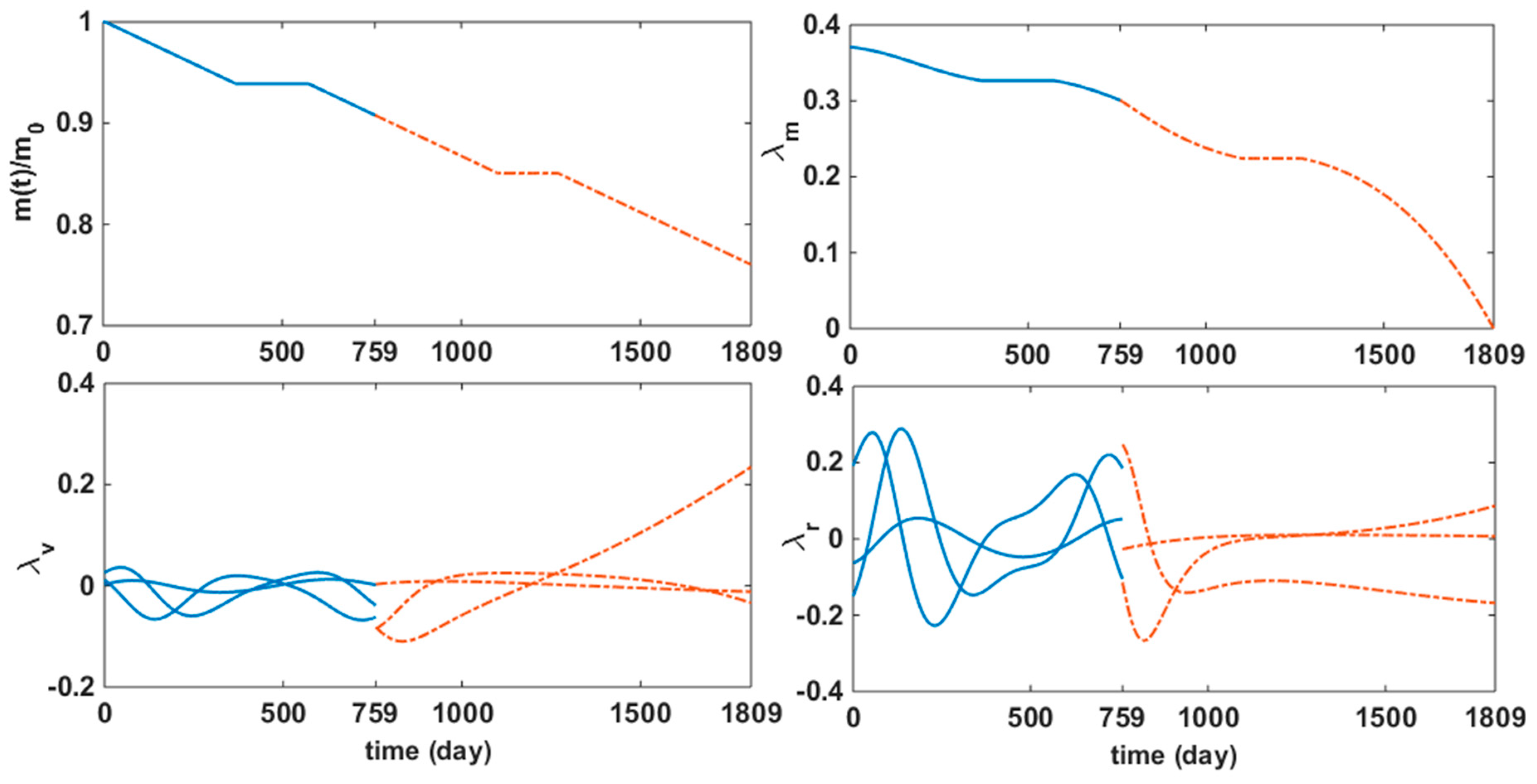
| Parameter | Value |
|---|---|
| Initial Position, km | [-1.25326142025922E+08, 7.83493051133693E+07, -3.62097454475238E+03] |
| Initial Velocity, km/s | [-1.62697077142250E+01, -2.53616129608122E+01, 1.47459860098919E-03] |
| Final Position, km | [-6.20180296761522E+08, 5.04570725212524E+08, 1.17797453566354E+07] |
| Final Velocity, km/s | [-8.40428050226635E+00, -9.53464925506379E+00, 2.27651689048206E-01] |
| Initial time, TDB | Feb 17, 2022 |
| Time of Flight, day | 1809 |
| GA time, TDB | March 18, 2024 |
| Final time, TDB | Feb 01, 2027 |
| , kg; ( | 20000 |
| , kg; ( | 19819 |
| , s | 6000 |
| , N | 2.26 |
| [0.743699843081560; 0.352463239633363, -0.277598991926813, -0.079343331137383; 0.023718570580293, 0.049511669434066, 0.003327795085571; 0.457631920898898] |
[0.743699843081560; 0.192035090839654, -0.149833850785203, -0.063080789937559; 0.011833279537100, 0.026101523172379, 0.002858568363144; 0.370611693389334] |
| Our results | GALLOP | |
|---|---|---|
| GA time, , TDB | March 18, 2024 | March 18, 2024 |
| TOF, day | 1,809 | 1,809 |
| GA altitude, , km | 500 | 500 |
| , km/s | 0.8 | 1.04 |
| GA , km/s | 3.654 | -- |
| 53.74 | -- | |
| 1.2256e-16 | -- | |
| Final mass, , kg | 15,068.17 | 14,879 |
| GA time, , TDB | March 18, 2024 | March 18, 2024 |
| Parameter | Value |
|---|---|
| , km | [1.16465658375768E+08, -1.73955158925876E+08, -6.50236091435127E+06] |
| , km/s | [2.10481455623537E+01, 1.55555848401697E+01, -1.90278457157558E-01] |
| GA , AU/yr | [0.524178202715554, -0.565039214276219, 0.008672119576309] |
| GA , AU/yr | [0.765632779887656, 0.088191564273440, -0.011661984497357] |
| GA , AU/yr | [0.241454577172102, 0.653230778549659, -0.020334104073666] |
| GA | [0.008360758766825, -0.062264141998319, 0.078717645223935, -0.053488824816944; 0.030663561324637] |
Disclaimer/Publisher’s Note: The statements, opinions and data contained in all publications are solely those of the individual author(s) and contributor(s) and not of MDPI and/or the editor(s). MDPI and/or the editor(s) disclaim responsibility for any injury to people or property resulting from any ideas, methods, instructions or products referred to in the content. |
© 2024 by the authors. Licensee MDPI, Basel, Switzerland. This article is an open access article distributed under the terms and conditions of the Creative Commons Attribution (CC BY) license (http://creativecommons.org/licenses/by/4.0/).




